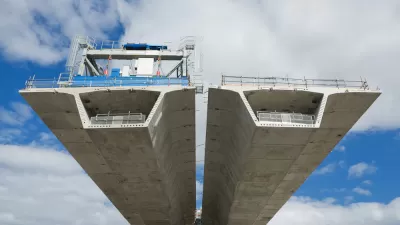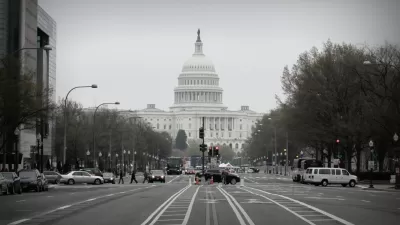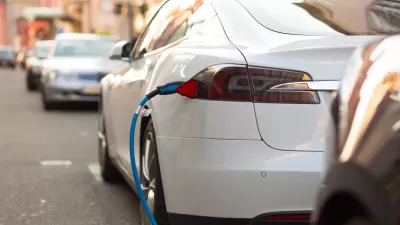A $287 billion, five-year transportation reauthorization made its way out of its first Senate committee this week.

"The first transportation bill to acknowledge climate change won unanimous support Tuesday from the Senate Committee on Environment and Public Works," report Ashley Halsey III and John Wagner for The Washington Post.
The notion that the bill would substantively address the causes and symptoms of climate change contradicts early criticisms of the bill, accused of dumping new levels of spending on highway expansions without considering climate change.
Senator John Barrasso (R-Wyo.) is quoted in the article saying: "Ninety percent of that money will go directly to our roads and bridges," which suggests a focus on fixing the nation's transportation infrastructure before building more.
As reported in another article by Elvina Nawaguna for Roll Call, the bill would also expedite permitting for the nation's large infrastructure projects, a promise made by President Trump in the 2018 State of the Union address, which suggests policy change intended to expand the capacity of the country's car and truck transportation infrastructure.
That kind of spending to expand the status quo of transportation would only exacerbate the causes of climate change.
As for the promised action to address climate change, Senator Thomas R. Carper (D-Del.) is also quoted in the Post article mentioning the reauthorization bill's proposed spending on climate change adaptation. "He said the legislation would channel $10 billion to reducing emissions and increasing the resilience of infrastructure so that it will better stand up to the impact of climate change," according to the article.
According to Nawaguna, climate change mitigation provided one of few sore spots during the committee's markup of the bill, as Senator Joni Ernst (R-Iowa) was one of two lawmakers to express dissatisfaction with $1 billion allocated for "the construction of charging and refilling stations for electric, natural gas and hydrogen-powered vehicles," instead of biofuels.
Now the bill heads to the Senate Finance Committee, where discussions about the federal gas tax, and whether it should be increased for the first time since 1993, are more likely to occur.
FULL STORY: Senate committee acknowledges climate change in passing $287 billion transportation bill

Maui's Vacation Rental Debate Turns Ugly
Verbal attacks, misinformation campaigns and fistfights plague a high-stakes debate to convert thousands of vacation rentals into long-term housing.

Planetizen Federal Action Tracker
A weekly monitor of how Trump’s orders and actions are impacting planners and planning in America.

In Urban Planning, AI Prompting Could be the New Design Thinking
Creativity has long been key to great urban design. What if we see AI as our new creative partner?

King County Supportive Housing Program Offers Hope for Unhoused Residents
The county is taking a ‘Housing First’ approach that prioritizes getting people into housing, then offering wraparound supportive services.

Researchers Use AI to Get Clearer Picture of US Housing
Analysts are using artificial intelligence to supercharge their research by allowing them to comb through data faster. Though these AI tools can be error prone, they save time and housing researchers are optimistic about the future.

Making Shared Micromobility More Inclusive
Cities and shared mobility system operators can do more to include people with disabilities in planning and operations, per a new report.
Urban Design for Planners 1: Software Tools
This six-course series explores essential urban design concepts using open source software and equips planners with the tools they need to participate fully in the urban design process.
Planning for Universal Design
Learn the tools for implementing Universal Design in planning regulations.
planning NEXT
Appalachian Highlands Housing Partners
Mpact (founded as Rail~Volution)
City of Camden Redevelopment Agency
City of Astoria
City of Portland
City of Laramie





























